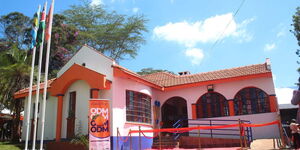The United Kingdom, the United States of America, and South Sudan have been listed as some of the main countries where Kenyan banks are transporting physical cash to.
According to the Survey on Cross-Border Movement of Cash, 15 commercial banks transported physical cash across the border, representing 39.4 per cent of licensed commercial banks in Kenya.
In the report released by the Central Bank of Kenya (CBK) on Wednesday, July 2, the main reasons for banks to transport physical cash across borders were the repatriation of foreign currency and to promote operational efficiency by meeting the liquidity needs of their foreign subsidiaries.
CBK revealed the primary source of this cash was customer deposits across branches, with other sources including group subsidiaries, currency exchange agencies, and central banks of other countries.
The UK, listed as the main destination for physical cash outflows, accounted for 42 per cent of the total. The US accounted for 15 per cent, Switzerland for 12 per cent, and Germany for four per cent.
Regionally, commercial banks primarily transported physical cash to South Sudan (15 per cent) and the Democratic Republic of Congo (DRC) (eight per cent). Also, the most common currencies transported physically were US Dollars, euros, and Great British pounds.
In the report, the main recipients of physical cash transported across borders were financial services companies that specialise in cross-border payments and foreign exchange. Other recipients were bank customers, counterparties at group subsidiaries, and foreign correspondent banks.
Even so, the report did not explicitly reveal the amount of physical cash transported, but the figures are believed to be vast sums of cash in the region of billions.
To establish the legitimacy of the cash transported across borders, banks used Know Your Customer (KYC) and Customer Due Diligence (CDD), the use of a counterfeit money checker machine sourced only from globally licensed currency note suppliers, and sought regulatory approvals from the originating country.
Nonetheless, 67 per cent of the banks were noted to have experienced instances of cash smuggling or irregularities in cash declarations. However, the banks indicated that these incidents rarely occurred.
CBK noted that the main challenges faced by banks in managing cross-border physical cash flows were a lack of technological solutions and insufficient cooperation from clients or other institutions.
Other challenges faced include lack of training/ resources, complexity of regulations, lack of visibility of cross border cash transactions if not declared by the customer, gaps in implementation of laws at national level, failure by cash depositing customer to provide the necessary documentation and monetary instrument declaration for custom purpose and exposure to country risk in destination jurisdictions.












